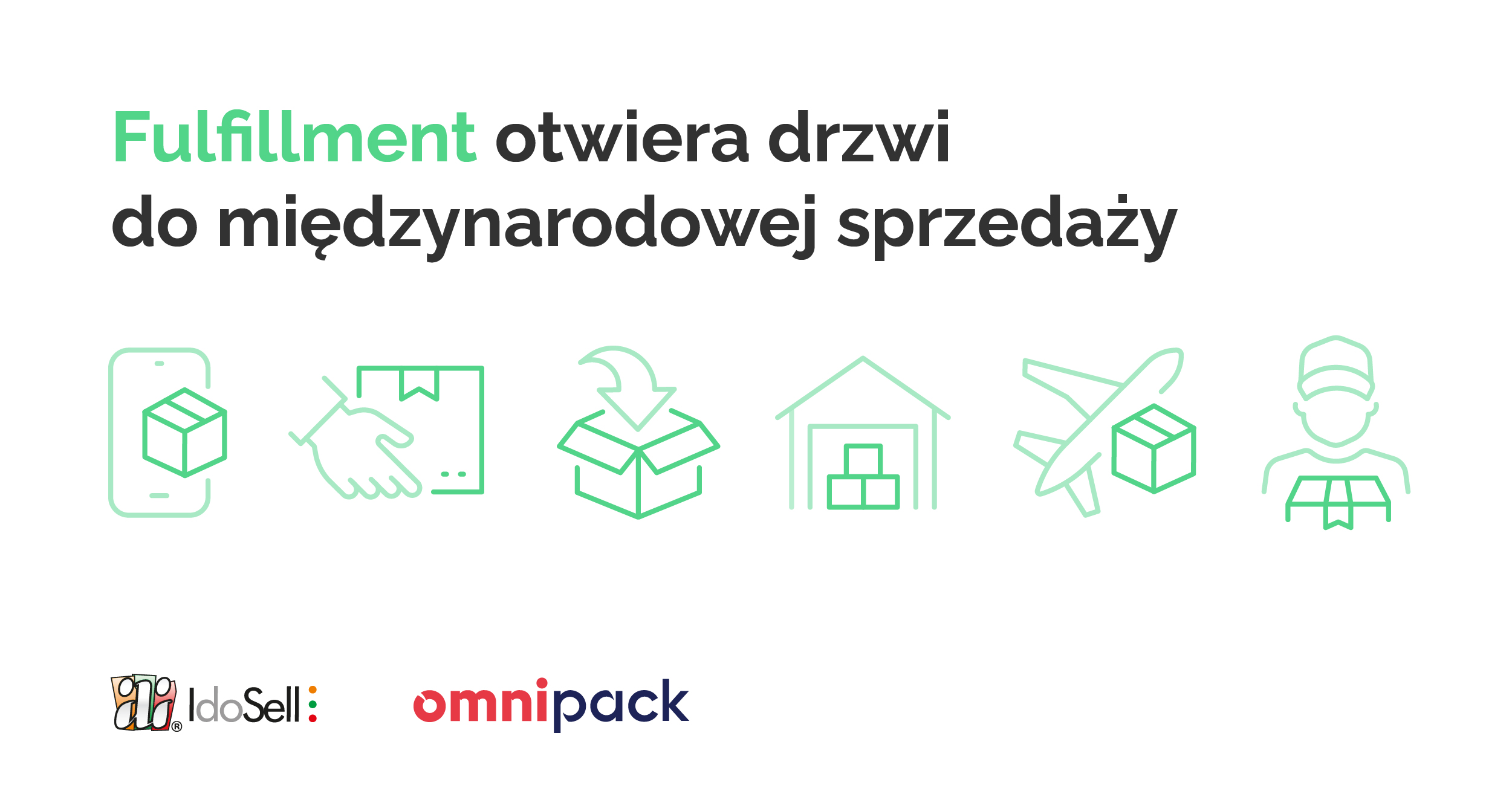
Jak fulfillment otwiera drzwi do międzynarodowej sprzedaży
E-commerce jest sektorem biznesu świetnie przystosowanym do sprzedaży zagranicznej. Jednakże kierowanie oferty na rynki niemieckie, brytyjskie czy norweskie wymaga przemyślanej obsługi klienta, marketingu i logistyki. Dużą pomocą dla sprzedawców są centra fulfillmentowe, czyli zewnętrzne firmy logistyczne. Jak taka firma może pomóc Ci podbić zagraniczne rynki?

Jak przebić się za granicą?
Chciałbyś odnieść sukces w międzynarodowej sprzedaży, ale nie wiesz od czego zacząć? Ważne jest, żebyś zrobił dokładną analizę rynku i preferencji konsumentów w danym kraju. Każdy rynek rządzi się swoimi prawami. Może więc okazać się, że popularny i uwielbiany w Polsce produkt kompletnie nie przypadnie do gustu mieszkańcom sąsiednich Niemiec.
To jednak tylko początek. Drugą istotną kwestią są uwarunkowania prawne, przede wszystkim związane z przetwarzaniem danych osobowych, komunikacją z klientami i zwrotami towarów. Sprawa jest nieco łatwiejsza na terenie Unii Europejskiej, ponieważ zdecydowana większość przepisów jest ujednolicona.
Jedne z największych wyzwań związanych ze sprzedażą międzynarodową stanowią kwestie języka i obsługi klienta. Klienci chętniej robią zakupy w sklepie internetowym posiadającym opcję wyboru wersji językowej, którą znają. Przykładowo aż 55 proc. konsumentów z Niemiec stwierdziło, że robienie zakupów w sklepach internetowych w obcym języku jest niekomfortowe. (badanie Ecommerce Report: Germany 2019)
Aby zagraniczna ekspansja okazała się sukcesem, należy zadbać zarówno o spójną wersję językową sklepu internetowego i obsługi klienta. Sklep, który działa na rynku niemieckim powinien dawać możliwość zadania pytania oraz otrzymania odpowiedzi po niemiecku. Wpływa to pozytywnie na doświadczenia klientów i zwiększa szanse sprzedaży.
Kolejna kwestia, o której należy pamiętać to logistyka. Często obowiązuje tu zasada, że im dłuższą trasę musi pokonać paczka, tym jej wysyłka będzie droższa. Polski sklep nie będzie w stanie zaoferować konkurencyjnych cen klientom ze Stanów Zjednoczonych ze względu właśnie na koszty wysyłki. Klienci są przyzwyczajeni do niedrogiej (lub darmowej), ale także szybkiej dostawy. Jak sprostać tym wymaganiom?
Z pomocą przychodzi model logistyczny oparty na kompleksowym outsourcingu procesów związanych z magazynowaniem, pakowaniem i wysyłką zamówień do klienta. Chodzi o usługę fulfillmentu, często określaną też jako order fulfillment. To model logistyczny, w którym firma realizuje zamówienia w imieniu klienta (w tym przypadku sklepu internetowego). Co należy wiedzieć o tym modelu i dlaczego sprawdza się w sprzedaży międzynarodowej?
Fulfillment, a sprzedaż międzynarodowa
Powiedzmy najpierw kilka słów o samym modelu fulfillment. Załóżmy, że prowadzisz sklep internetowy, który dynamicznie się rozwija. Każdego miesiąca masz coraz więcej klientów. To z jednej strony wspaniała wiadomość! Z drugiej jednak – coraz więcej pracy. W takiej sytuacji sklepy internetowe mają dwie możliwości: mogą albo zatrudnić więcej osób do pakowania i obsługi przesyłek, albo nawiązać współpracę z firmą logistyczną, która będzie realizować wysyłkę w imieniu klienta. Centra fulfillmentowe oferują własne magazyny, w których udostępniają odpowiednią dla każdego klienta ilość miejsca.
Firmy zajmują się ponadto:
- Odbiorem towaru od hurtowni i dystrybutorów
- Przechowywaniem produktów w sposób efektywny, bezpieczny i dopasowany do potrzeb danej kategorii produktowej
- Zbieraniem informacji o zamówieniach (poprzez tzw. systemy WMS, czyli zaawansowane platformy, które dzięki integracji ze sklepem internetowym, na bieżąco informują magazyn o nowych zamówieniach)
- Przygotowywaniem paczek do wysyłki
- Współpracą z kurierami i wysyłką
- Obsługą reklamacji i zwrotów

Jak fulfillment usprawnia sprzedaż zagraniczną?
Warto w tym miejscu wspomnieć o kilku kwestiach:
1. Po pierwsze, ponieważ centra logistyczne każdego miesiąca wysyłają z jednego magazynu zamówienia dla setek klientów, mają wynegocjowane bardzo atrakcyjne stawki z większością firm kurierskich. Dla Ciebie, jako właściciela biznesu eCommerce, oznacza to, że także możesz zaproponować klientom dostawę tańszą niż dotychczas, bez strat w jakości usługi.
2. Firmy fulfillmentowe mają wieloletnie doświadczenie w wysyłce towarów. Oznacza to, że zespół takiej firmy wie, jak pracować efektywnie, a same magazyny są wypełnione technologią i rozwiązaniami, które przyspieszają pracę. W efekcie możesz realizować więcej zamówień każdego dnia, niezależnie, czy wysyłka idzie do Polski, czy innego dowolnego kraju.
3. Trzecia kwestia wynika bezpośrednio z drugiej. Centra fulfillmentowe są przygotowane do obsługi tysięcy zamówień dziennie. Jeśli zatem zdecydujesz się wyjść z ofertą za granicę, nie ma obaw, że nie podołasz dodatkowym zamówieniom płynącym z nowego rynku.
4. Po czwarte, największe firmy logistyczne i tak już prowadzą działalność na terenie całej Europy, a nawet świata. W rezultacie wszelkie procedury związane z taką sprzedażą mają już rozpracowane. Ty, jako właściciel firmy, nie musisz się nad tym zastanawiać. Z miejsca otrzymujesz gotowe rozwiązanie.
Co więcej, najbardziej zaawansowane firmy 3PL pomagają też klientom w rozliczeniach księgowo-podatkowych wysyłek zagranicznych i pośredniczą w obsłudze celnej realizowanych zamówień. Korzyść jest oczywista – jako przedsiębiorca, nie musisz się martwić dodatkowymi formalnościami i komplikacjami wynikającymi ze sprzedaży za granicą. Możesz się zatem skupić na działaniach sprzedażowych i marketingowych na nowym rynku.
Kiedy fulfillment się opłaca?
Choć model, który omawiamy w tym artykule, wiąże się z wieloma konkretnymi korzyściami, należy podkreślić, że nie jest to rozwiązanie dla każdego sklepu. Wiele (szczególnie nowych i małych) sklepów internetowych uzna tę usługę za niepotrzebne, dodatkowe obciążenie. Dlatego firmy fulfillmentowe kierują swoją ofertę głównie do firm, które wysyłają około 1000 paczek miesięcznie.
Oczywiście nie jest to sztywna wartość, ale to właśnie mniej więcej ten próg sugeruje, że sklep dobrze się rozwija i jest gotowy na ekspansję zagraniczną. Jednocześnie duże sklepy internetowe nie będą postrzegały fulfillmentu jako niepotrzebnej komplikacji, a jako realne ułatwienie codziennej pracy.
Podsumowanie: ekspansja zagraniczna z usługą fulfillmentu
Podsumujmy krótko. Choć ekspansja zagraniczna to kamień milowy w rozwoju każdego sklepu internetowego i też bez wątpienia ogromne wyzwanie, to sama branża stwarza dogodne warunki do prowadzenia działalności w wielu krajach jednocześnie. Aby jednak było to możliwe i efektywne, należy zadbać o:
Rozeznanie się na nowym rynku przed podjęciem decyzji o ekspansji
Obsługę klienta i marketing w nowej wersji językowej
Zaplanowanie kwestii logistycznych
W tej ostatniej kwestii ogromną pomocą może okazać się usługa fulfillmentu dla eCommerce. Jeśli chcesz wiedzieć więcej na jej temat, zapraszamy do odwiedzenia strony Omnipack.io. Eksperci Omnipack chętnie odpowiedzą na Twoje pytania i pomogą wybrać rozwiązanie logistyczne dopasowane do Twoich planów i potrzeb.
Powiązane treści

